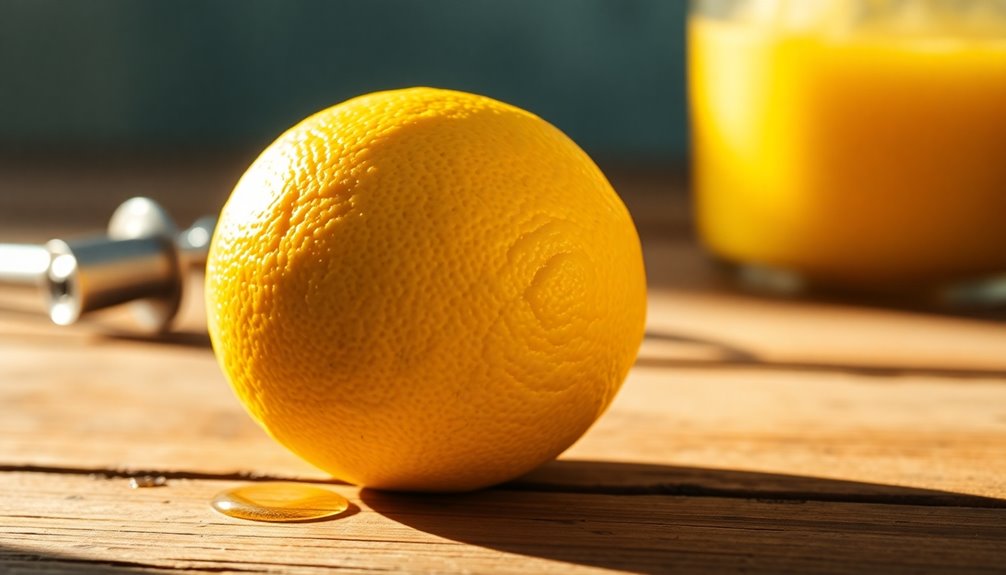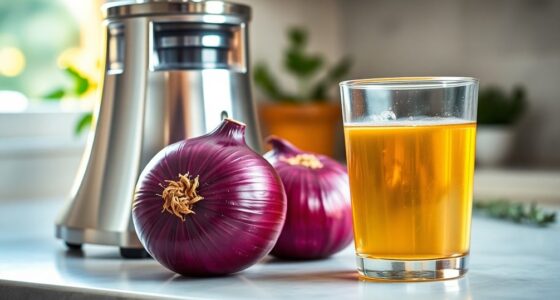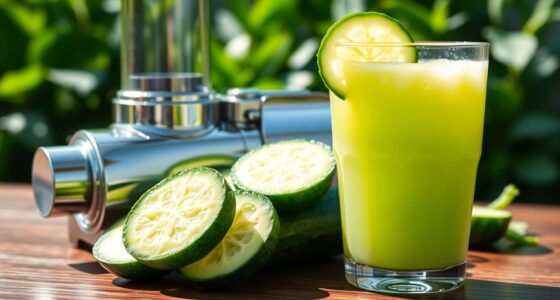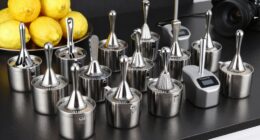A medium lemon usually yields about 3 tablespoons of juice, but some may provide as little as 2 1/2 tablespoons. Knowing how much juice you can expect helps you plan better for your recipes. If you're making a dish that requires a specific amount of lemon juice, it's smart to have an extra lemon or two on hand. Want tips on how to maximize your juice yield? There's more you should know!
Key Takeaways
- A medium lemon typically yields about 3 tablespoons of juice.
- Some medium lemons may produce as little as 2 1/2 tablespoons of juice.
- Juice yield can vary based on the size and ripeness of the lemon.
- Warming lemons in the microwave can increase juice yield by 1.5 times.
- Meyer lemons are often juicier and sweeter than regular lemons, affecting yield.
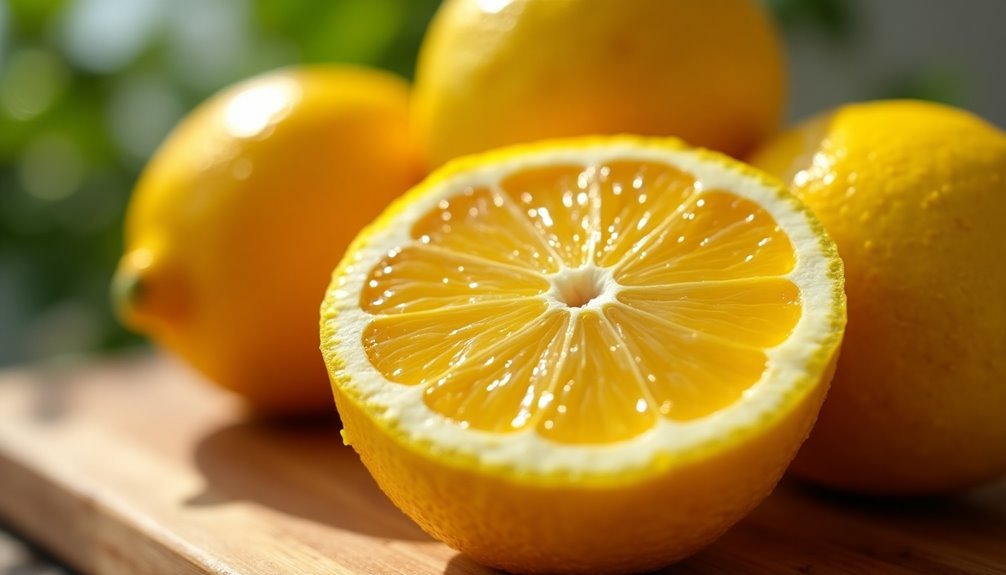
Have you ever wondered just how much juice you can squeeze from a medium lemon? The answer might surprise you! Typically, a medium lemon yields about 3 tablespoons of juice. However, this isn't a hard and fast rule. Depending on the lemon's size and ripeness, you might find that some medium lemons produce as little as 2 1/2 tablespoons of juice. So, if you're planning to use lemons for your recipes, you'll want to consider this variation.
Now, if you need more juice for your culinary creations, you can always grab extra lemons. For instance, if a recipe calls for 6 tablespoons of lemon juice, you'll need about two medium lemons to achieve that goal. This kind of planning helps ensure you won't end up scrambling at the last minute to find more lemons—always a good idea when you're in the kitchen!
When you think about how much juice you can get from a lemon, remember that larger lemons usually yield more juice. If you're looking for a significant amount of juice, you might want to consider using large lemons instead.
But if you've got medium lemons on hand, don't worry, there are ways to maximize your juice yield. One fantastic juicing tip is to warm your lemon in the microwave for about 10-20 seconds before juicing. This simple trick can increase the juice yield by about 1.5 times, making it much easier to squeeze out every last drop.
If you're using Meyer lemons, keep in mind that they're often slightly sweeter and juicier than regular lemons. They can give your recipes a unique flavor boost, but you should still be aware of how much juice you're getting. The juice of one Meyer lemon might differ from that of a standard lemon, so it's always good to taste as you go.
Before you get started, it's essential to know how much juice you'll need for your specific recipes. If the recipe requires a precise measurement, having a few extra lemons around can save you from potential disappointment. It's not uncommon to have a situation where you think you've got enough, only to find out that the lemons you selected just didn't yield enough juice.
Frequently Asked Questions
How Much Lemon Juice Is in a Medium Lemon?
When you're wondering how much lemon juice is in a medium lemon, it typically yields around 2.5 to 3 tablespoons.
If you're using it for a recipe, that amount should suffice for flavor.
Keep in mind that juicing techniques matter; rolling the lemon on a hard surface before cutting can help you get out more juice.
Adjust according to your taste preferences, and you'll find the right balance for your dish.
How Much of Bottled Lemon Juice Is Equal to 1 Lemon?
When you're looking to substitute bottled lemon juice for fresh lemons, you'll generally want to use about 2 to 3 tablespoons of bottled juice for each lemon.
Since bottled juice can be more concentrated, start with 3 tablespoons and adjust based on your taste preference.
Always check the label for added preservatives or flavorings, as these can impact the taste in your dish.
Fresh juice typically offers a brighter flavor, so keep that in mind!
Can You Substitute Bottled Lemon Juice for Fresh Lemon Juice?
Imagine standing in your kitchen, the aroma of fresh lemons enveloping you.
Yes, you can substitute bottled lemon juice for fresh, but be cautious. Bottled varieties often lack the vibrant flavor and complexity of fresh juice.
While 2 tablespoons of bottled juice usually equate to one medium lemon, you should taste as you go. Adjust based on your recipe, and remember that fresh juice's essential oils are often missing from bottled options.
What Is the Ratio of Lemons to Juice?
When you’re juicing lemons, the ratio of lemons to juice can vary. Generally, one medium lemon yields about 3 tablespoons of juice, but this can differ. The exact yield can depend on the lemon’s size, ripeness, and freshness, which means that sometimes you may need to use more lemons to achieve your desired amount of juice. If you’re wondering how much juice does one lemon yield, it’s useful to keep in mind that larger lemons can produce up to 4 tablespoons or more. Experimenting with different lemons can help you find the best ones for your juicing needs.
If you need a specific amount, like ½ cup, you'll usually need about 3 medium lemons. It's smart to have a few extra on hand since some lemons might produce less juice than expected.
Always check the yield to ensure you've got enough for your recipe!
Conclusion
In conclusion, one medium lemon typically yields about 2 to 3 tablespoons of juice, like a burst of sunshine in your kitchen. This zesty addition can elevate your dishes and drinks, bringing a refreshing brightness to your meals. So, the next time you squeeze that lemon, remember how a little juice can go a long way in enhancing flavors. Don’t hesitate to experiment and enjoy the tangy goodness that lemons bring to your culinary creations! Additionally, if you’re wondering how much juice in a lemon can transform a recipe, you’ll be pleasantly surprised. Just a tablespoon or two can provide that perfect balance of acidity, cutting through richness and brightening up even the simplest dishes. So, whether you’re making a salad dressing or a homemade lemonade, knowing how much juice in a lemon to use can truly elevate your cooking experience.
Cindy thoroughly researches juicing trends, techniques, and recipes to provide readers with practical advice and inspiration. Her writing style is accessible, engaging, and designed to make complex concepts easy to understand. Cindy’s dedication to promoting the advantages of juicing shines through her work, empowering readers to make positive changes in their lives through the simple act of juicing.

